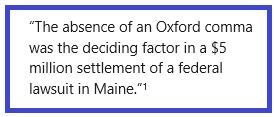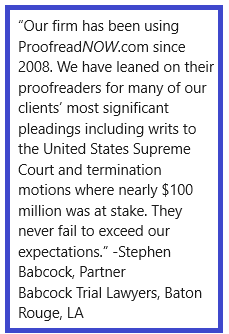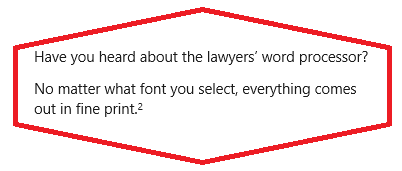The legal field rests upon evidence and precedence. We respect that, because so do we.
We’ve proofread and copyedited (easily) tens of thousands of legal documents in the past 20+ years. Often dozens of legal and legal marketing documents in a single day:
Website copy, newsletters, press releases, pleadings, motions, briefs, blog posts, practice descriptions, emails, event/webinar invitations, internal communications, special reports, pitch decks/collateral, slide presentations, correspondence, miscellaneous court filings, RFP responses, and more.
The unfortunate verdict is in: Legal marketing teams and lawyers/attorneys, even at (especially at?) the largest of firms, commit a lot of writing errors.
The sheer volume of daily documentation flowing through the typical law firm is staggering. Combine that volume with the perpetual race against the clock that defines many law firm environments and it’s easy to see why writing quality and proofreading bandwidth suffer.
Our most recent survey of completed legal proofreading jobs revealed an average of 118 errors per document, ranging from 39 to 191 errors. (Have mercy, Your Honor.)
 While typos aren’t capital offenses, they are an easy but preventable way to ruin your credibility, embarrass your firm, drive away prospective clients, annoy a judge, and damage or even destroy a case (here are nine such examples).
While typos aren’t capital offenses, they are an easy but preventable way to ruin your credibility, embarrass your firm, drive away prospective clients, annoy a judge, and damage or even destroy a case (here are nine such examples).
Sure, you can foist the work of proofreading onto your paralegals, but there are three troubling issues with that approach:
- Paralegals are (rightfully so) expensive. We’re less expensive.
- Paralegals are experts at legal research. We’re not. Paralegals aren’t experts at proofreading/copyediting. We are.
- Paralegals can’t give 100% to 19 responsibilities under constant deadlines. That reduction in focus/imposed rush puts their research and analysis at risk. We can give 100% to a single responsibility: quickly perfecting your documents.
In the end, wouldn’t you rather save damages for court cases? You can do that by avoiding the eight most-common types of errors we see in legal documents.
 8 Writing Errors That Can Ruin Your Firm’s Credibility
8 Writing Errors That Can Ruin Your Firm’s Credibility
- Poor Organization: A lack of “consecutive sentences,” so to speak. Disorganized writing also encompasses formatting faux pas—early line breaks, orphaned words, missing page numbers, a table of contents that doesn’t match the contents, and inconsistent title case in headings.
- Nonadherence to Style Guide: This spans everything from punctuation preferences to formatting stipulations to word choices. Many firms, for example, proscribe the use of “experts,” “expertise,” and even “the firm,” and then improperly use them without restraint.
- Misspelled Words: Missing letters, extra letters, etc. “Legislation” spelled “legslation,” “of” versus “or,” “manger” vs. “manager” (the latter error was printed by a law firm on 9,000
 copies of a newsletter that we weren’t asked to proofread).
copies of a newsletter that we weren’t asked to proofread). - Inconsistent/Incorrect/Missing Punctuation and Capitalization: Commas that are MIA, misplaced apostrophes, semicolons that have no business semicoloning, random quotation marks without their partners—the list goes on.
- Misleading/Confusing Language:
 –Misplaced modifiers (e.g., “As a 20-year NASA veteran, it’s easy to see that the dog is the only one who could have committed this crime.” This construction implies that the dog, instead of the human writer, worked at NASA).
–Misplaced modifiers (e.g., “As a 20-year NASA veteran, it’s easy to see that the dog is the only one who could have committed this crime.” This construction implies that the dog, instead of the human writer, worked at NASA).
–Missing hyphens that confuse the meaning of phrases (e.g., emergency company ecosystems versus emerging-company ecosystems).
–Sentence meanings that can’t be deciphered (e.g., “OIG suspect of carving out separate fee arrangements when federal reimbursement is involved.” Do they mean “suspects” or “is suspected of,” since there’s a big difference between the two?).
–Obscure abbreviations that aren’t spelled out.
–The use of “their” when there are multiple entities interacting with each other (who is doing what?). - Missing Words: This is when words simply flew the coop before they ever got a chance to help fill the page (e.g., “[Entity] has previously held to furnish” versus “[Entity] has previously held contracts to furnish”).
- Repetitive Wording: This is more than covering your ass-ets. It’s “providers who provide” and “actual bona fide” and “pays FMV for fair market value services” as well as countless others. The excessive wordiness that’s the meat of lawyer ribbing the world over.
- Incorrect Words: There are the less egregious examples such as “services enables,” “complexity and variation means,” “into” versus “of,” “with” versus “on,” and “Eight Circuit” versus “Eighth Circuit.” And then there’s the multiple RFP responses by renowned law firms that contained substantial recycled text related to other companies. (Imagine if the prospect had read multiple instances of the original client’s name! Don’t worry; we prevented that from happening!)
We think the supporting evidence is clear: Professional proofreading is a must for reputable law firms.
Still not convinced? Try us for free. We’ll more than meet the burden of proof.

*****
We’ve created hundreds of free writing resources for legal firms and anyone who wants to up their writing game. Check out these and more:

2 https://www.hopkinslawfirm.com/lawyer-jokes



